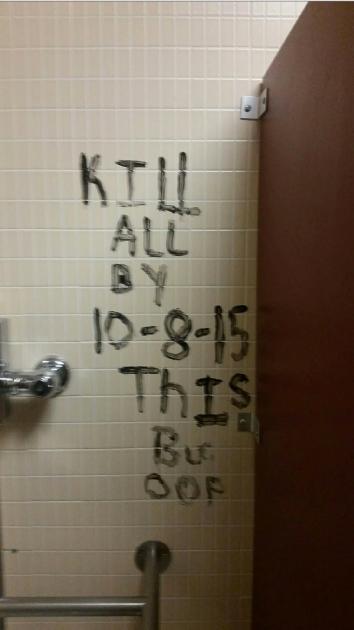In a message smeared recently onto a bathroom wall in the Eastern Kentucky University student center, someone promised to “KILL ALL BY 10-8-15.” That’s Thursday.
Students, staff, and faculty have been living and working under this threat for several days now, and it’s been hard to settle upon the proper emotional and logistical response. In a different cultural context—that is, in a week that hadn’t followed the mass shooting at Umpqua Community College in Roseburg, Oregon—we might have viewed the graffiti as a misguided prank. But when midnight rolled around on Monday, and I had to decide whether to cancel my Tuesday philosophy classes, my only thoughts were those of a parent. Subjective probability suggested that the chances of experiencing any real violence were remote. But hyperbolic alternatives are the philosopher’s lifeblood. I canceled class.
Instead of requiring my students to walk the now creepy campus, I asked them to contribute to an online discussion about Hobbes’ Leviathan, our scheduled reading. They had to write a paragraph explaining what Hobbes would say about our situation and its instigator. Most of the students argued that the instigator had failed to recognize the point of the social contract. We relinquish some of our liberties and form a covenant with a powerful sovereign, in exchange for protection from other mechanically rapacious and desirous beings like ourselves. Only a Leviathan can protect us from the state of nature: the war “of every man against every man,” where life is “nasty, brutish, and short.”
The students did a terrific job under the circumstances. But Leviathan is not only about the origin of justice in the psychology of fear. It’s also about the origin of justice in the lap of good manners. Hobbes writes that a covenant made in a state of nature is void because there is no guarantee that the contractors will keep their promises to one another: “[B]efore the names of just and unjust can have place, there must be some coercive power to compel men equally to the performance of their covenants.” And there is no such coercive power in a state of nature.
So what is the real origin of civil society? Certainly there can be no justice or injustice without contracts, the breaking of which constitutes injustice. But there are no secure contracts in a state of nature. This means we have to start with something else: a free gift. People give up their liberty as a gift to the sovereign without expecting anything in return, for in a state of nature, there is no overarching power to ensure fair exchange. Nevertheless, the sovereign in fact expresses gratitude, so the gift givers will not repent their good will. Without this gift and that ensuing gratitude, Hobbes writes, “there will be no beginning of benevolence or trust; nor consequently of mutual help.” Every man will remain in a state of war.
On Wednesday, the EKU administration decided to cancel all classes for the rest of the week. A major university has been forced to shut its doors because there was no way to be certain, in the present climate, that the graffiti message was a hoax. Going forward, administrators will be under the pressure of best practices to shut down every time a threat appears—one more signal that we have entered a new era of insecurity.
I’m not a complete stranger to guns. My father, a Vietnam War veteran, stored his rifle out in the open among our basement’s rafters. In middle school, I discovered at summer camp that though I had very little athletic ability, I had a talent for sports that require good aim. As an undergraduate, I had to take apart and clean a M16 as part of a misguided ROTC stint, produced by some late-night stress about the cost of college.
It might be unjust, under present law, to take away people’s guns. But at this point in my life, as the teacher of hundreds of young people and the mother of two small children, and in this climate of underfunded psychiatric care and hair-trigger anxiety, I think the time has come for private gun owners to give our commonwealth a very important gift.
